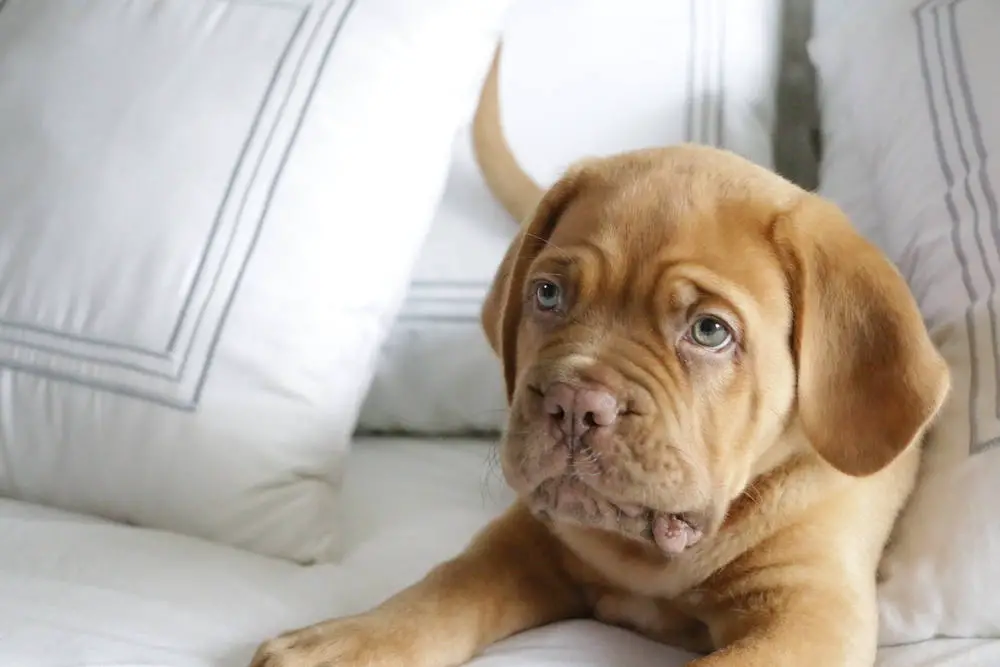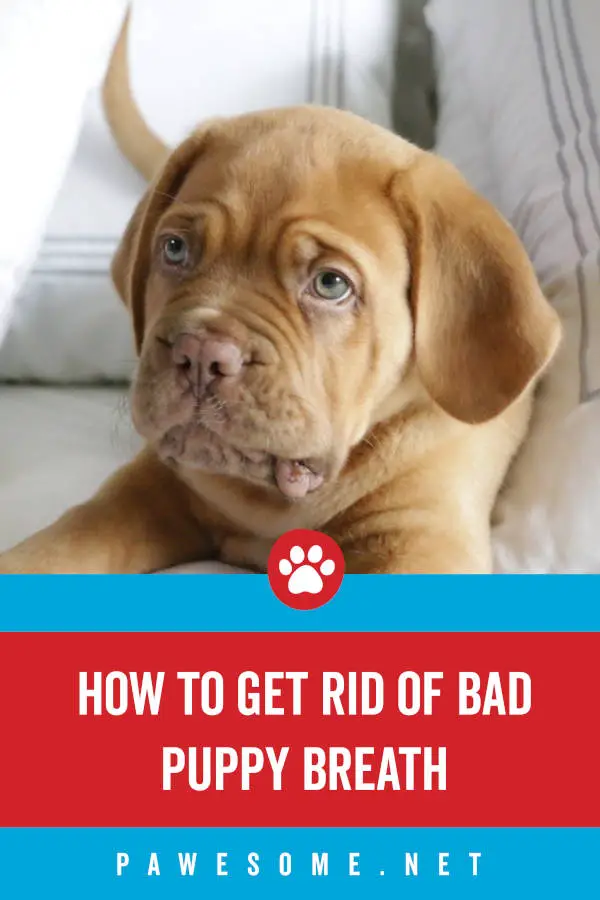 We, humans, brush our teeth twice a day not just to remove stains and keep gum health but also to keep bad breath at bay. But when it comes to bad breath among puppies, many pet owners seem to dismiss it as a natural occurrence.
We, humans, brush our teeth twice a day not just to remove stains and keep gum health but also to keep bad breath at bay. But when it comes to bad breath among puppies, many pet owners seem to dismiss it as a natural occurrence.
Sure, they are not known for daisy fresh breath. But their mouths are not supposed to stink like a trash can.
If this is news to you, keep reading. This one is definitely for you.
Halitosis: What Is It, What Causes It and How to Fix It
If you are unfamiliar with the term, halitosis is the technical term for bad breath. It’s the same for humans and canines.
And just like us, experts say, puppies develop bad breath when too much plaque and tartar builds up in their mouth and increases bacteria content to an unhealthy level. It pushes the gums away from the teeth and leaves newer areas vulnerable to bacteria attacks.
Hydrogen sulfide and methyl mercaptan, produced by some bacteria, are the primary culprits. If it is left untreated, this leads to a film of bacteria on the teeth and leads to a lingering stink.
This condition is called periodontal disease and is not uncommon in canines that do not chew well or whose owners do not brush their teeth regularly.
When plaque combines with saliva and other minerals, it turns to calculus. This causes irritation of the gums and leads to gingivitis.
When the gums turn red along the lining of the teeth, your puppy is in the early stages of periodontal disease. If there is a space of more than two millimeters between the teeth and gums of your puppy, it is irreversible.
Periodontal disease leads to cavities, infections, loss of teeth, pus formation, gum inflammation and tissue destruction. It is one of the most common diseases among canines.
All of this leads to extremely bad breath so it’s not wise to ignore it. Part of the treatment may also require X-rays. It is not just difficult but also extremely inconvenient to your puppy.
If it is left unchecked, there is a possibility that the bacteria will enter the bloodstream and lead to endocarditis, a heart condition.
Coprophagia: Don’t Let Them Eat out of Dust Bins
Puppies, like some other animals, often tend to eat out of garbage bags. Some of them also drink toilet water, if left unsupervised.
You might think that’s normal and ignore the smell but here’s the problem with it. Sometimes dust bins contain decomposing meat.
That is not the worst thing in the world for your puppy to eat but it might develop a habit of unchecked snacking in your baby. That leads to many other unhealthy scenarios.
If your puppy doesn’t chew that food properly or you don’t brush its teeth, we’re back to periodontal disease. It’s best to get rid of such habits while they are still puppies and trainable.
Here’s another scenario. Many dogs like cat poop and sometimes their own poop.
That, apart from being disgusting for you, is also unhygienic for your pet. It is a condition called coprophagia and leads to bad breath.
You might want to get your dog out of that habit.
Diabetes: Sweet Breath Is Also Bad News
When you start smelling something funky, you need to investigate further. Check if your puppy’s breath is fruity.
If yes, that is not good news. It is possible that your little canine has diabetes.
It suppresses the immune system and leads to a growth in bacterial content which is very likely to show up in your puppy’s mouth.
Take them to the veterinarian immediately. While you are at it, make sure they are not drinking and peeing more than usual.
That’s a sign of diabetes too.
Could Be Kidney or Liver Issues, Could Be Something Much Bigger
We don’t mean to scare you but something as simple as bad breath could be a sign of very serious problems. It sounds gross but keep reading.
If your puppy’s breath smells like urine or ammonia, it is possible that they have kidney issues. According to Dr. Steve Barghusen of Pet Crossing Animal Hospital and Dental Clinic in Minnesota, waste products that are usually taken care of by kidneys can build up in the bloodstream and show up in the form of bad breath.
When they eat poop, their breath smells like poop. But the same logic is not applicable to the smell of urine.
So don’t ignore it. Sometimes, kidney diseases are a sign of bigger problems.
If the foul smell comes coupled with puking and loss in appetite, it might be a liver issue. This too can be a sign of bigger problems.
It is crucial that you take your dog to the veterinarian and get them thoroughly checked out.
How to Fix It?
Initially, you will have to go to the veterinarian to eliminate the more serious possibilities. Once that is done, let’s get to fixing things on the home front.
All you need to do is change some of your puppy’s habits. You are lucky if it is solvable this way.
If the problem is limited to tartar in the mouth and periodontal disease, get a dental cleaning appointment. It is routine for the vet to get some bloodwork done.
This is to make sure your puppy is okay with anesthesia and also rule out other grave health issues. Cleaning of the mouth means removing loose or broken teeth and fixing what’s left in there.
A cleaning procedure called dental prophylaxis is also helpful. It is a procedure where the teeth are thoroughly cleaned. It stops the spreading of periodontal disease and gingivitis too.
This is where your job begins. Once you bring your puppy back home, get into the habit of brushing their teeth regularly.
Ideally, you need to get one of the special toothbrushes and toothpastes made for dogs. But you can make do with a sensitive bristle human toothbrush.
You need to brush their teeth gently in a circular fashion from front to back. If your puppy is being a pain, you could also ask your vet to suggest a gel or other water additives to help your case.
This not only keeps their teeth and gums healthy but is also something puppies are known to enjoy once they get used to it. Get a good chew toy that matches the size of your dog to keep them from eating crap (literally!) and also avoid boredom.
You remember the last time you raided the refrigerator because you had nothing else to do. It’s not all that different in dogs.
Remember that smaller dogs are more likely to have dental issues because their teeth are closer. Take your dog to the vet regularly to keep tabs on its health – dental and otherwise.
For a while, you need to keep an eye out for snacking-from-a-garbage-can habits.
Don’t let them wander outdoors without supervision. Keep litter boxes and trash cans out of reach.
It is good to investigate until your dog gets rid of these bad habits. Discreetly, check if your dog is eating cat poop or their own poop.
That way you know if you need to check up on them at home too. We won’t talk about cleaning up after your dog because that is the civilized thing to do anyway.
If your dog has grown fond of cat poop, make a note of where cats poop in your neighborhood. Be strict with your dog in and around those spaces.
Since bad breath is caused by volatile sulfur compounds in the mouth, apart from sniffing their mouth, you could also get a sulfur monitor to check for bad breath.
Ask your vet if there is a need for dental chews. Sometimes, it is helpful to add large-sized kibbles to the diet. It is very easy to keep your puppy’s breath fresh. Just remember that you have a puppy, not a pig and that bad breath is not a natural phenomenon.
It is great to inculcate these habits while they are young and trainable.
Make sure you brush their teeth regularly. Make appointments with groomers or the vet for polishing and cleansing.
Take them to the vet and make sure there are no underlying health issues leading to bad breath. Follow it up with weekly, quarterly and half-yearly checks with the vet.
In Conclusion
Make sure they are not loitering in the neighborhood feeding on decomposing meat or cat poop. Also, check and see if they are eating their own poop.
Check their teeth regularly for yellow or brown stains or an overall change in color. See if the gums are swollen or red.
If your puppy’s breath is bad even after all of this, you might have a serious health issue on your hands. As long as you consult a vet and don’t ignore it, we hope your puppy comes back home happy and healthy.

